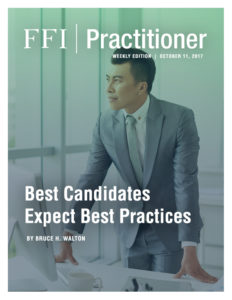
View this edition in our new enhanced digital edition format with supporting visual insight and information.
When a family company recruits an outside executive, particularly at the COO or CEO level, candidates pay attention to what they might be getting into. Family businesses have a reputation for being idiosyncratic. Best candidates will look for best practices both within company governance and within the search process. It helps to be aware of things they will look for. Thanks to Bruce Walton of Battalia Winston for this article and case study.
Article:
At some point a family business of moderate scale may need to reach outside the family to recruit leadership. Here is a case of a $100+-million revenue, third generation company CEO succession.
Case Study
We had a CEO search where the company needed to transition to a PhD level CEO to drive a major product and strategy shift. The family chairman/CEO would kick-up to non-executive chairman. We identified a world-class potential candidate who would not even consider the job because of the company’s family ownership. He had heard too many war stories about family-owned businesses. Only when he understood that there were both an active, professional outside board and a family council already in place was he willing to talk. He quickly became the top, and ultimately the successful, candidate.
A question here, as in almost every CEO succession search, was, “Will the CEO let go?” There was ample evidence that he might not. To deal with this issue, the board appointed a non-family co-chair to the search committee and worked to ensure that both the actuality and the symbols of transfer of power would be carried through. Activities included defining the boundaries of responsibility between CEO and the newly created non-executive chairman role, creating a non-family lead director role, and ensuring title transitions would occur on a pre-defined schedule.
They moved the incumbent’s office away from headquarters, published press releases, and inserted articles in the company’s employee newsletter. They also monitored for “bad behavior,” e.g., the non-executive chairman getting involved in managing vs. governing. With guidance from the next generation of the family, the board went so far as to define “trip wires” that could ultimately cause the former CEO to be removed from the board. This took delicate negotiations within the family and was supported by a clear-eyed board and experienced family business consultants.
Three years later, and not without some significant twists and turns, the successful candidate has had a huge, positive impact on the company.
Observations
“A-level” candidates will have experience in well managed and governed companies. They develop good habits and look for good, if not best, practices in a company they might join. They may not know about family business dynamics, but they probably have heard some horror stories. As a result, they look for signals that the company will be managed and governed in reasonable ways.
How do they make those judgments? They ask questions about governance structures and processes. For example:
- Is there a board with independent outsiders?
- Is there a formal mechanism for communicating ownership’s objectives and priorities to the board?
- Do board members bring expertise about issues that will affect the trajectory of the company going forward, rather than just being friends of the chairperson?
- Is there discipline in the governance processes?
- Is the board too deferential to ownership?
- Is attention paid to preparing the family, and particularly the younger generation, to be wise owners?
If answers to these questions are lacking, “A-level” candidates may well back away. Do your clients really want to settle with “B-level” candidates?
At the same time, candidates will look at the recruitment process itself for signals about how things will be run.
- Are communications timely, candid and complete?
- Is the interview process done gracefully and thoughtfully?
- Does the process move forward at a reasonable pace and cadence?
Just the way hiring managers look at everything the candidate does as “the best they have to offer,” candidates look at the recruiting process for signals about how the company runs.
Best practices in governance, including both structure and process, attract quality candidates. Best practices don’t just appear overnight or by magic. They take work, strong value systems and often the advice of trusted family business advisors.
About the contributor
 Bruce H. Walton is a partner in the Boston office of Battalia Winston, a 53-year-old retainer-based executive recruiting firm. A co-leader of the Family-Owned Business Practice, he has more than 30 years of executive search experience and primarily recruits CEOs and their direct reports. He has degrees from Princeton and Harvard and is a popular contributor to FFI Practitioner. He can be reached at bwalton@battaliawinston.com.
Bruce H. Walton is a partner in the Boston office of Battalia Winston, a 53-year-old retainer-based executive recruiting firm. A co-leader of the Family-Owned Business Practice, he has more than 30 years of executive search experience and primarily recruits CEOs and their direct reports. He has degrees from Princeton and Harvard and is a popular contributor to FFI Practitioner. He can be reached at bwalton@battaliawinston.com.
About Battalia Winston
Battalia Winston has been partnering with companies to identify and recruit elite executive talent since 1963. The firm conducts searches for key executive, senior leadership and management positions, providing a diverse and inclusive slate of candidates for every search. Through well-established relationships in the US, Europe, South America, and Asia, the firm offers clients the advantages of both global reach and local knowledge.






